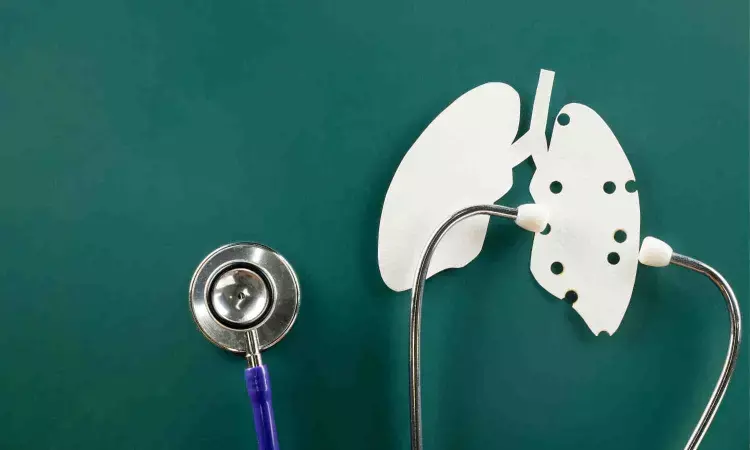- Home
- Medical news & Guidelines
- Anesthesiology
- Cardiology and CTVS
- Critical Care
- Dentistry
- Dermatology
- Diabetes and Endocrinology
- ENT
- Gastroenterology
- Medicine
- Nephrology
- Neurology
- Obstretics-Gynaecology
- Oncology
- Ophthalmology
- Orthopaedics
- Pediatrics-Neonatology
- Psychiatry
- Pulmonology
- Radiology
- Surgery
- Urology
- Laboratory Medicine
- Diet
- Nursing
- Paramedical
- Physiotherapy
- Health news
- Fact Check
- Bone Health Fact Check
- Brain Health Fact Check
- Cancer Related Fact Check
- Child Care Fact Check
- Dental and oral health fact check
- Diabetes and metabolic health fact check
- Diet and Nutrition Fact Check
- Eye and ENT Care Fact Check
- Fitness fact check
- Gut health fact check
- Heart health fact check
- Kidney health fact check
- Medical education fact check
- Men's health fact check
- Respiratory fact check
- Skin and hair care fact check
- Vaccine and Immunization fact check
- Women's health fact check
- AYUSH
- State News
- Andaman and Nicobar Islands
- Andhra Pradesh
- Arunachal Pradesh
- Assam
- Bihar
- Chandigarh
- Chattisgarh
- Dadra and Nagar Haveli
- Daman and Diu
- Delhi
- Goa
- Gujarat
- Haryana
- Himachal Pradesh
- Jammu & Kashmir
- Jharkhand
- Karnataka
- Kerala
- Ladakh
- Lakshadweep
- Madhya Pradesh
- Maharashtra
- Manipur
- Meghalaya
- Mizoram
- Nagaland
- Odisha
- Puducherry
- Punjab
- Rajasthan
- Sikkim
- Tamil Nadu
- Telangana
- Tripura
- Uttar Pradesh
- Uttrakhand
- West Bengal
- Medical Education
- Industry
A new smartphone-sized device can test for tuberculosis reveals research

Tulane University researchers have developed a first-of-its-kind handheld diagnostic device that can deliver rapid, accurate tuberculosis diagnoses in under an hour, according to a study published in Science Translational Medicine.
The smartphone-sized, battery-powered lab-in-tube assay (LIT) provides a cost-effective tool that can improve TB diagnoses, particularly in resource-limited rural areas where health care facilities and lab equipment are less accessible. Over 90% of new TB cases occur in low- and middle-income countries.
This point-of-care device is the first to detect Mycobacterium tuberculosis (Mtb) DNA in saliva, in addition to blood and sputum samples. Saliva is easier to obtain than blood or sputum, and the ability to non-invasively obtain samples that yield accurate results is critical for successfully testing children. More than 1 million children fall ill with TB each year and more than half go undiagnosed or unreported, according to the World Health Organization.
Tuberculosis is the world’s deadliest infectious disease, infecting an estimated 10 million people a year. The current resurgence of TB cases, exacerbated by recent disruptions in healthcare services, underscores the urgent need for effective, accessible diagnostic tools.
“TB remains a critical public health concern in low-income countries and diagnosis using a cheap, simple test like we’ve developed is needed not only to treat patients with TB but prevent further spread of the disease,” said senior author Tony Hu, PhD, Weatherhead Presidential Chair in Biotechnology Innovation and director of the Tulane Center for Cellular & Molecular Diagnostics. “An estimated 4.2 million TB cases were undiagnosed or unreported in 2021, largely due to limitations and costs of testing in areas with high disease burden.”
Current testing devices are larger, expensive and require either extensive on-site technology or shipment of samples to a laboratory elsewhere. The LIT test is designed to offer a low-cost TB testing solution, with each device costing less than $800 and less than $3 per test. In comparison, another commonly used TB testing device costs at minimum $19,000 and the cost per test is around $100 in certain countries.
In the study, the LIT device demonstrated high accuracy in testing blood samples from children in the Dominican Republic, outperforming the more expensive machine – 81% sensitivity compared to 68% – and meeting the WHO criteria for TB diagnostics. Blood serum-based testing – testing that utilizes the liquid part of drawn blood after coagulation – is particularly important in children and patients living with HIV who often cannot produce sputum. The LIT assay results suggest that blood samples could be used to monitor TB treatment progress, as they closely align with the improvement in patient symptoms.
“This system reduces the expertise and equipment required for TB diagnosis which is essential for point-of-care application,” said lead author, Brady Youngquist, a graduate student in the Tulane University Center for Cellular and Molecular Diagnostics. “Saliva-based testing for TB is particularly exciting because it can be easily obtained in all patients and can be used for portable testing without the need for blood draw. And sputum is often not produced in children and patients living with HIV, a common co-infection.”
Reference:
Brady M. Youngquist et al. ,Rapid tuberculosis diagnosis from respiratory or blood samples by a low cost, portable lab-in-tube assay.Sci. Transl. Med.17,eadp6411(2025).DOI:10.1126/scitranslmed.adp6411.
Dr Kamal Kant Kohli-MBBS, DTCD- a chest specialist with more than 30 years of practice and a flair for writing clinical articles, Dr Kamal Kant Kohli joined Medical Dialogues as a Chief Editor of Medical News. Besides writing articles, as an editor, he proofreads and verifies all the medical content published on Medical Dialogues including those coming from journals, studies,medical conferences,guidelines etc. Email: drkohli@medicaldialogues.in. Contact no. 011-43720751


